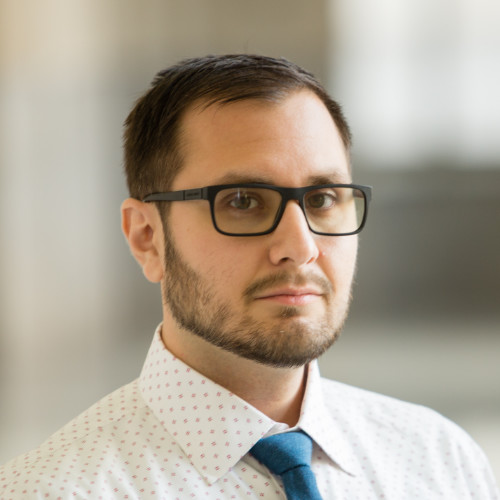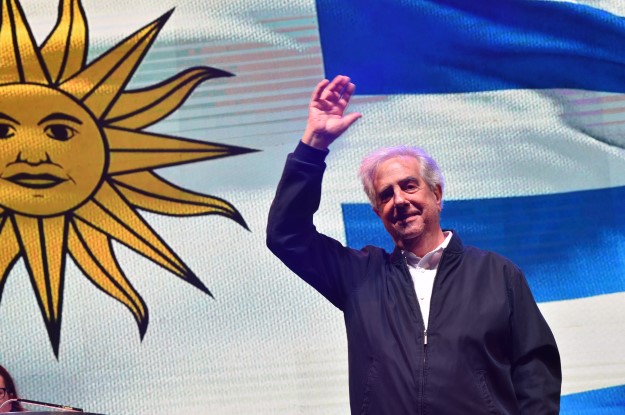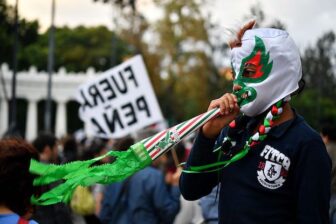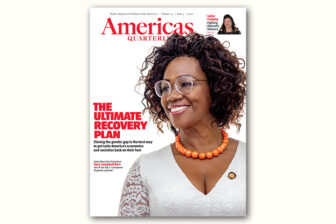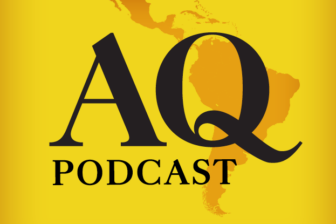Tabaré Vázquez, the two-time president of Uruguay (2005-10; 2015-20), died Sunday of the disease he fought against his whole life: cancer. An oncologist who continued to see patients even while he governed, Vázquez was not the most charismatic leftist leader of his era in Latin America, which included figures such as Luiz Inácio Lula da Silva, Cristina Fernández de Kirchner and the famously austere, Volkswagen Beetle-driving fellow leftist whose presidency bridged Vázquez’s two terms, José Mujica.
Yet Uruguay quietly, perhaps unglamorously, became Latin America’s model of social inclusion over the past 15 years. Poverty fell from 26% to 9%; extreme poverty was all but eradicated; inequality became the lowest in the region; and the minimum wage tripled. Some of this progress was due to the commodities boom of the 2000s, but Uruguay avoided the worst effects of the ensuing bust in the 2010s that brought down his higher-profile rivals.
However, Vázquez’s most underappreciated accomplishment – and one that carries lessons for the rest of Latin America even today – was his key role in the transformation of Uruguay’s left from radical to pragmatic.
As recently as the late 1980s, the Uruguayan left continued to promote an economic program formulated in the mid-1960s that favored the nationalization of vast portions of the economy, radical land reform and a hostile attitude towards foreign investment. Several of its leaders, including Mujica, had taken up arms during the 1973-85 dictatorship. After the fall of the Eastern bloc in 1989, Uruguay’s Frente Amplio (FA) – a coalition of leftist parties that included Communists – fell deeper into ideological squabbles. The FA seemed perpetually distant from power, with stagnant vote totals in consecutive elections.
Enter Vázquez, who in 1989 ran to become mayor of Montevideo. He was seen as a political novice and few expected him to win, but his moderate and pragmatic profile as well as being a prominent doctor assuaged the electorate. His pragmatism and unassuming personality were a result of his working class background.
Born in 1940, he grew up in the working-class neighborhood of La Teja. His family lived in precarious housing and he worked multiple jobs to help keep the family’s finances in check. During the 1960s, he lost his father, mother and sister to cancer and he would dedicate his life to battling the disease. He became a doctor in 1969 and grew into one of Uruguay’s most-respected oncologists. He also had real world experience managing an organization, as he was president of a local soccer club that went from relative obscurity to winning the country’s first-division championship. This fame helped him become the mayor of the capital city, Montevideo, in 1989. Vázquez exceeded expectations by taking his experience in administration and he governed the capital city in an efficient manner. He proved that to win, the FA needed to abandon radical politics and demonstrate governability and so began the long road towards ideological moderation.
The 1990s saw Vázquez and the FA fall short in elections, in part because of a 1996 constitutional reform that changed the electoral rules. But after the crisis of 2002, when Uruguay was thrown into the worst economic and social crisis of its modern era as it suffered from Argentina’s collapse next door, the appetite for change was finally large enough. Although radical elements on the left wanted a default on the debt and others wanted to oust the president, Vázquez remained committed to supporting the integrity of the country’s institutions. Vázquez was the ideal candidate to convince the population that the FA had a moderate and pragmatic agenda. He won the 2004 election with an outright majority of the vote, becoming the first president to gain power who did not originate from Uruguay’s traditional parties, the Partido Nacional and the Partido Colorado.
Vázquez’s first term in office was among the most transformative in Uruguay’s history. It initiated the latest wave of inclusive social legislation, and also strengthened labor laws to empower the country’s unions and collective bargaining institutions, making the union movement the strongest (measured as a share of workers who are members of a union) in Latin America. He greatly expanded access to the pension and healthcare system. His government oversaw the implementation of Plan Ceibal to give all students in the country access to a computer. He also passed a tax reform that made the tax system more progressive. As an oncologist, he also took on big tobacco by implementing some of the most restrictive anti-smoking laws in the world.
There were setbacks, one of them being his inability to sign a free trade deal with the United States. He frustrated his base and resigned from the Socialist Party when he decided to veto a law legalizing abortion in 2008 on personal grounds. Vázquez finished his first term in office with a 61% approval rating. His second term, following an economic slowdown and Mujica’s poor management of government finances, was not as positive. Unemployment grew from 7.5% in 2015 to 8.9% in 2019, his vice president resigned due to a corruption scandal, and the country experienced a disturbing wave of crime that the government proved unable to convincingly tackle. After fifteen years in power, the FA lost the 2019 general elections to Luis Lacalle Pou and his centre-right coalition.
I was present at the public ceremony in March when Vázquez gave the presidential sash to Mr. Lacalle Pou. An indelible image is the sincerely felt emotion on Vázquez’s face of transferring power to a new generation of leaders. In many ways, Vázquez represented the pragmatism at the heart of Uruguay’s political culture. He transformed the country without falling into the populist trap: rapid and flashy policy changes that are unsustainable over time. He showed that transformative politics can happen in Latin America without leaving a legacy of debt, inflation or worse. That’s an example that will hopefully outlive him in Uruguay and beyond.
—
Saldías is a Latin America and Caribbean Analyst at the Economist Intelligence Unit and a PhD Candidate in Political Science at the University of Toronto.


